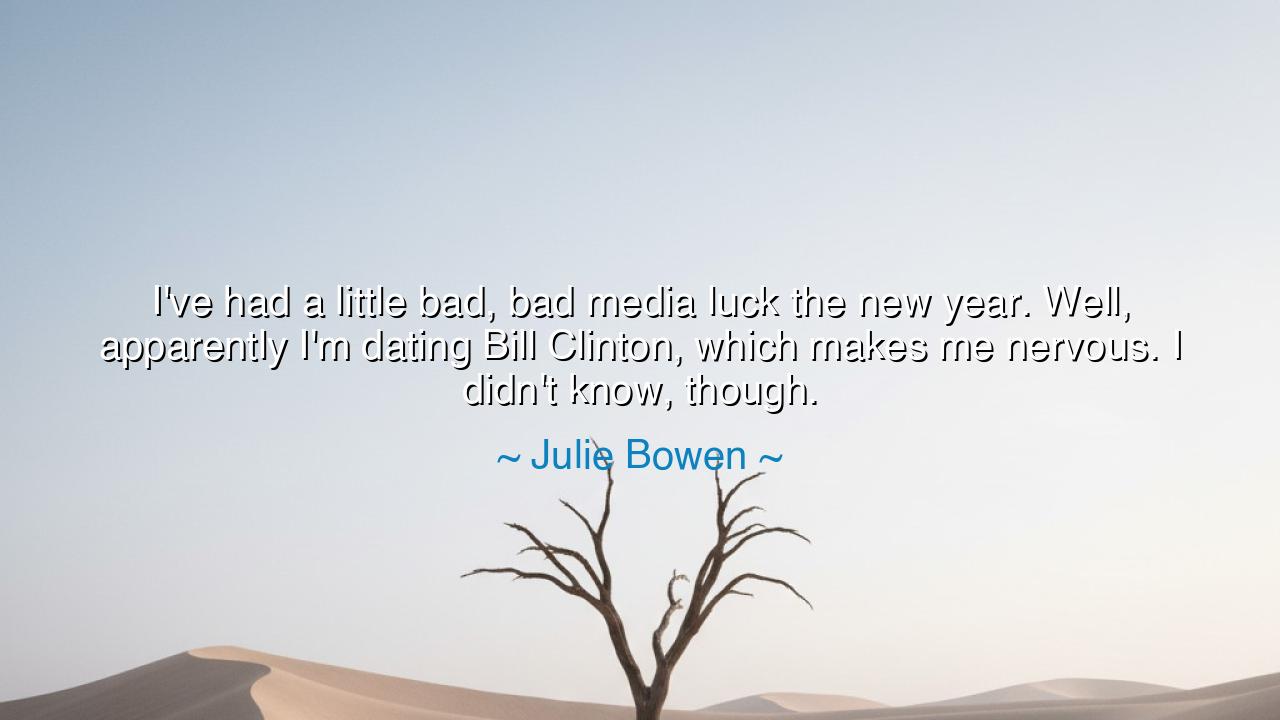
I've had a little bad, bad media luck the new year. Well
I've had a little bad, bad media luck the new year. Well, apparently I'm dating Bill Clinton, which makes me nervous. I didn't know, though.






In the words of Julie Bowen, “I've had a little bad, bad media luck the new year. Well, apparently I'm dating Bill Clinton, which makes me nervous. I didn't know, though.” — there flows not merely a humorous remark, but the deeper lament of one living beneath the unrelenting gaze of public scrutiny. Spoken with wit and self-awareness, her words reveal an ancient and eternal struggle: the battle between truth and rumor, between appearance and reality, between what is spoken about us and what we truly are. Though uttered in jest, this quote holds within it the weary wisdom of those who have walked through misunderstanding and emerged with their humor intact.
In every age, the powerful and the visible have faced the distortions of gossip. Long before the cameras and the internet, the ancients too knew the peril of reputation — how swiftly it can rise like a flame and how easily it can consume the truth. The philosopher Epictetus warned his students to “care not for what others say of you, but only for what you are.” Yet even the wise found it hard to escape the whispers of the crowd. Julie Bowen, in her modern plight, finds herself caught in the same old snare, one as old as civilization itself: the restless human urge to invent stories where mystery lives, and to mistake spectacle for substance.
Her words, half laughter and half exasperation, reveal a timeless truth: that fame is both a gift and a trap. The ancients might have said it thus — the gods favor some with light, but that same light reveals every imperfection. The “bad media luck” she speaks of is the modern face of an ancient trial. Where once it was poets and pamphleteers who shaped a person’s story, today it is the endless chorus of voices and screens. And yet, through her humor, she shows the strength of one who refuses to be defined by others’ inventions. To make light of falsehood is to rob it of power; to laugh at the storm is to rise above it.
There is a parallel in the story of Socrates, who was falsely accused of corrupting the youth of Athens and condemned to death. The city, intoxicated by rumor, could not see the man’s heart. And yet, even in his final hours, Socrates smiled and spoke calmly of truth and virtue. His dignity shone brighter than his accusers’ words. So too does Julie Bowen’s laughter echo that same defiance: that no lie, however widely spread, can undo the truth of one’s character. False words cannot define the soul that remains steadfast in truth.
Her playful mention of Bill Clinton serves as a symbol of how absurd and fleeting public gossip can be. In one moment, the tides of rumor raise a person to scandal; in the next, they sweep on to find a new victim. This is the nature of fame — as unpredictable as the sea, as fickle as the wind. The wise do not chase it, nor fear it. They know that to stand in the light is to cast a shadow, and that shadow will be shaped not by truth, but by the eyes of those who watch. Thus, the challenge for the modern soul is not to escape the shadow, but to remain true to one’s self beneath it.
From this, we learn a vital lesson: hold your peace amid noise, and hold your laughter amid falsehood. Do not answer every rumor, nor chase every lie, for the truth, like water, finds its own level in time. The world will always create stories; let your actions write the one that endures. Humor, grace, and self-knowledge are the shields that protect the spirit from the daggers of rumor. For as Julie Bowen shows, a little wit can turn even scandal into wisdom, and a storm of gossip into a gust of laughter.
So, to those who live in a world of voices — whether famous or forgotten — remember this: the only truth that matters is the one you live, not the one they tell. Walk with humility, speak with honesty, and when the world mocks or misjudges you, smile. For laughter, when rooted in self-understanding, is the song of the free soul. Be as Julie Bowen was in that moment — amused, unshaken, and utterly yourself. For though the crowd may tell a thousand tales, the wise know this truth: rumor fades, but character remains eternal.






AAdministratorAdministrator
Welcome, honored guests. Please leave a comment, we will respond soon